Movie Review – Grinch, The (2018)
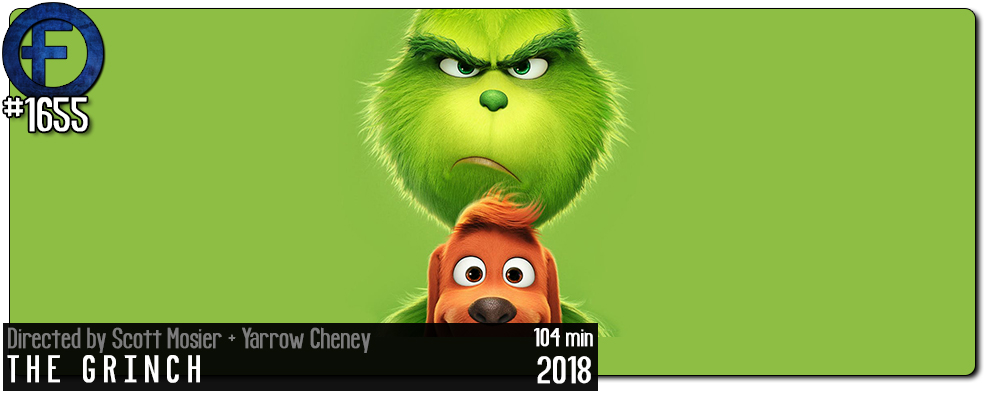
Principal Cast : Benedict Cumberbatch, Cameron Seely, Rashida Jones, Kenan Thompson, Angela Lansbury, Tristan O’hare, Ramone Hamilton, Sam Lavagnino, Scarlett Estevez, Pharrell Williams.
Synopsis: High atop Mount Crumpet, the hateful Grinch looks to steal Christmas away from the happy, joyous Whos from Whoville.
********
The third feature film adaptation of Dr Seuss’ classic book “How The Grinch Stole Christmas”, the 2018 computer animated Grinch takes the classic story and adds a touch of modern insanity and wit to proceedings. Whether you think it’s a good film will depend on your appreciation for whatever accent Benedict Cumberbatch tries to go with in his Grinch impression, as well as a cloyingly empty, saccharine and safe kiddie-friendly pleasantville movie, a movie so risk-averse to offending anybody it could quite easily be be the first thing you think of when searching for “bland” in the dictionary.
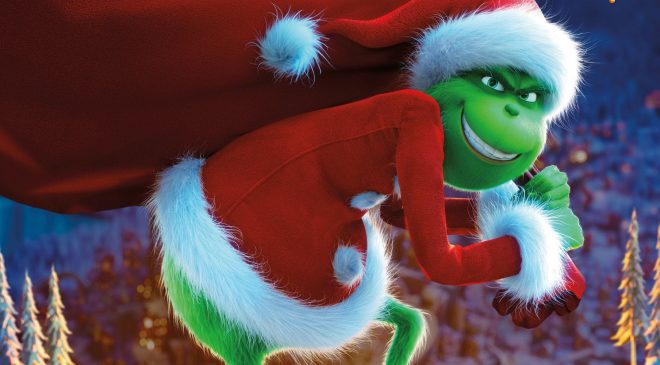
With the help of our friendly Narrator (Pharrell Williams, who must surely have shares in Illumination by this point, what with his standout hit “Happy” from the Despicable Me continuing to provide royalties, no doubt), we travel to Whoville, where the inhabitants, known as Whoos, are about to celebrate Christmas. Atop a nearby mountain lives the grumpy green creature known as the Grinch (Cumberbatch), who snarks and snarls his way through a life of misery due to a past development of hatred for the holiday season. Even with the pleading of resident Who child Cindy-Lou Who (Cameron Seely), who only wants happiness for her overworked mother (Rashida Jones), the Grinch is determined that if he hates Christmas he wants everyone else to too, so sets about with his plan to steal the holiday season out from under the noses of the unilaterally indifferent Whoos.
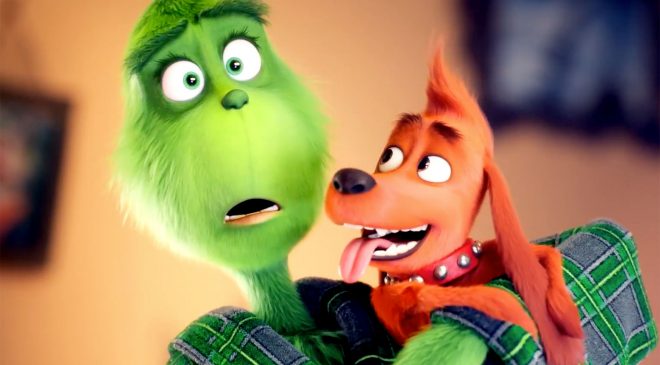
In the 18 years since Ron Howard’s live-action version of The Grinch came and went, that film continues to polarise audiences thanks to Jim Carrey’s hugely memorable performance. Whether you love or hate it, Howard’s The Grinch could never be described as anything other than something, which is a far cry from this version of Suess’ classic story. 2018’s The Grinch, directed by Scott Mosier and Yarrow Cheney (the former of whom is an alumni of Kevin Smith’s View Askew production company, the latter of whom is a long-time stalwart of Illumination Entertainment), is a light, fluffy, deliriously saccharine effort in animated film, lacking the sadness of Howard’s work (for what that’s worth) or even any notable differences from other similarly demographically targeted fare. Despite adhering to Seuss’ original text (embellished by Pherrell’s twanging accent) and displaying Illumination’s generally high standard of animation, there’s something missing from this Grinch tale, and that’s heart.
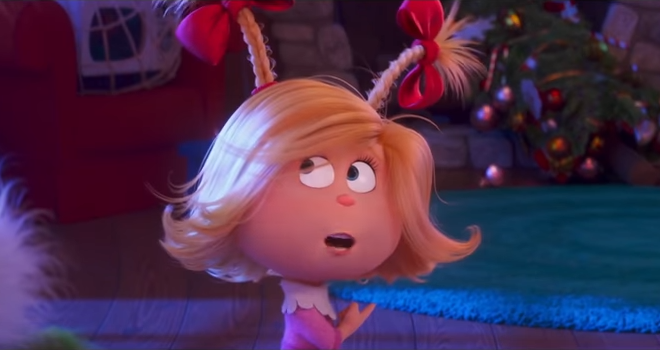
It could be argued that expanding Dr Seuss’ fairly simple text story to a feature film is what brings things undone – in Howard’s film, the role of Cindy-Lou Who and her family, not to mention the various denizens of Whoville, have entire arcs of their own, most of which were pretty hit and miss, leaving Carrey’s slapstick mugging to carry the film entirely – and The Grinch here is no different. The insertion of Cindy-Lou Who’s mother to that of an overworked matriarch for whom Christmas is something of a burden, is a tone-deaf method of giving the film some kind of emotional thrust, because the Grinch himself is a singularly one-note character of repute. This Grinch avoids a lot of the modern scaffolding to make him a more empathetic character, and in doing so retains a lot of the mystique the character holds when lifted from the written page. Trouble is, in restraining making the Grinch an emotionally capable character the film hangs on its secondary characters, and they aren’t developed well enough to shoulder such a classic story.
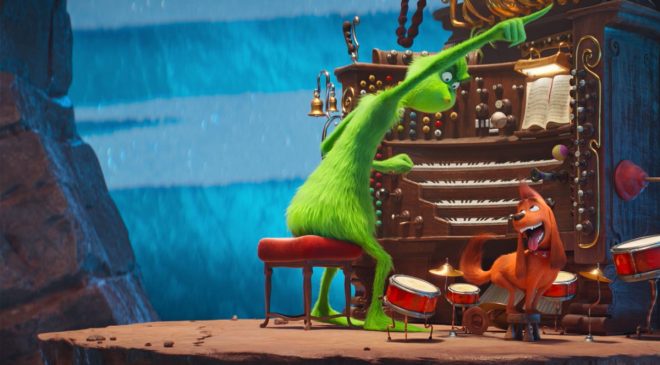
As you’d expect, the animation in the film is absolutely first rate, stylish and highly effective in bringing Suess’ iconic drawing style to vivid life. And the film is incredibly vivid, an orgy of contrasted colours and bright, energetically seasonal tones and hues, crackling editing and a dynamite sound design. The Grinch himself returns to his Seussian sleekness, a far cry from the snot-hued hairball Jim Carrey was saddled with, and the way the film handles his poor put-upon dog Max is actually the best thing about the movie. Guess those Secret Life of Pets films paid off, eh? Visually, the film is technically excellent, even if the story and characters never quite match it.
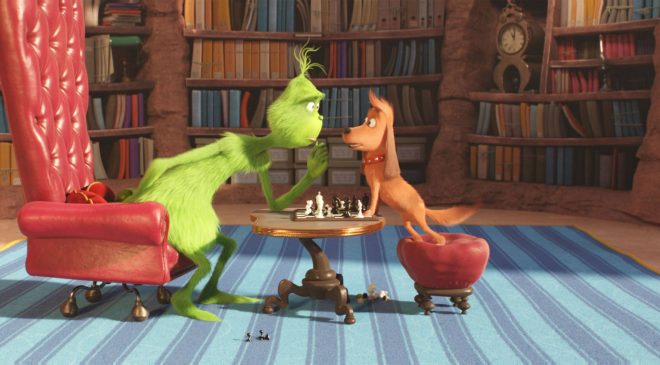
For his part, Benedict Cumberbatch feels like he’s utterly bored with the whole thing. His delivery and accent are borderline audience anaesthesia, a yawn-inducing lack of energy behind his bizarre accent and the film’s “hilarious” set pieces lacking engagement. As far as slapstick comedy goes, Cumberbatch isn’t the first name that springs to mind (although his work in that Penguins movie was absolutely hilarious) and the tree bears the fruit of his disinterest here. The work of Cameron Seely, as Cindy-Lou, and Rashida Jones, as Donna Lou, are commendable but unmemorable, and the denizens of Whoville (including a turn by Angela Lansbury) simply lack coherency. In terms of music, the inclusion yet again of “You’re A Mean One Mr Grinch” set to the postmodern tones of Tyler The Creator (together with Danny Elfman) is teeth-gratingly annoying, and the remixed, re-purposed addition of a load of Christmas favourite tunes is designed purely to capitalise on merchandising the film up the whazoo.
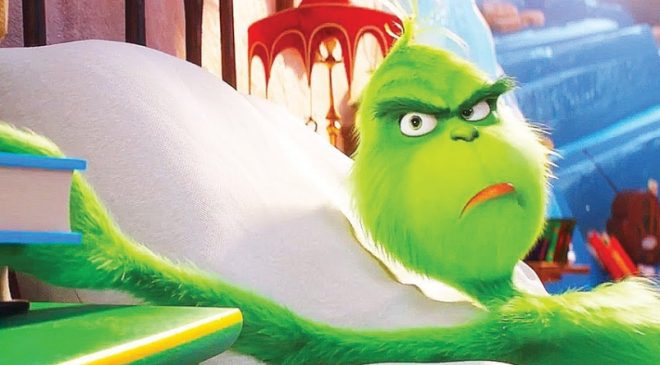
The Grinch is a film designed by committee, produced by a studio that has little interest in creative risks, and given the least possible breathing room for subtlety and nuance. It’s hard to bring something new to a story so well-known as this, but the bar for animated films has been set so high now that anything even vaguely lacking in soul gets utter condemnation from me. It’s a perfectly adequate, acceptable kids flick. Ergo: despite my misgivings about Ron Howard’s take on this story, at least he made a film that tried something. This film doesn’t try to do much but play things incredibly safe, in an era when animated films appear to be taking bigger chances and paying off.

